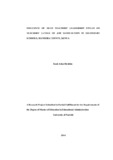| dc.description.abstract | The purpose of this study was to analyze the influence of head teachers’ leadership
styles on teachers’ levels of job satisfaction in public secondary schools in Mandera
County. The study sought to determine the extent to which autocratic, democratic,
and laissez faire leadership styles influenced teachers’ job satisfaction. The study was
carried out using descriptive survey design. The sample size comprised of ten head
teachers and 87 teachers. Data was collected by use of questionnaires for head
teachers and teachers and was analysed by use of descriptive statistics and Pearson
Product Moment Correlation Coefficient. Findings on the head teachers’ perception
of their leadership styles revealed a mean of 3.04 and a standard deviation of 2.80
which implied that the head teachers disagreed that they were autocratic in their
leadership styles. The findings implied that the head teachers did not agreed that they
were autocratic since this kind of leadership is perceived as treating human beings as
inhuman. Findings also revealed that democratic leadership style had a mean of 2.15
which implied that head teachers perceived themselves as democratic. Lissez faire
leadership style had mean score of 2.79 which implied that head teachers did not
perceive themselves as Lissez faire in their leadership. Teachers therefore viewed
their head teachers were democratic. In summary, teachers viewed their head teachers
as possessing the democratic leadership style. Findings also revealed that teachers
were not satisfied with the working conditions, pay and promotion, and recognition
aspect of their job. Findings on the influence of autocratic leadership style on
teachers’ job satisfaction revealed that autocratic head teachers negatively influence
(-0.65) teachers job satisfaction because they adopt harsh leadership styles which are
widely detested by the teachers and students alike. Findings on the influence of
democratic leadership style on teachers’ job satisfaction revealed that there was a
positive moderate (0.48) relationship between the democratic leadership style and job
satisfaction in secondary schools. Findings on the influence of Laissez-faire
leadership style on teachers job satisfaction revealed that that there is very strong
negative (0.75) relationship between laissez-faire leadership and job satisfaction in
secondary schools Based on the findings of the study, it was concluded that head
teachers perceived themselves as democratic. The study also concluded that
autocratic head teachers negatively influence teachers’ job satisfaction. It was also
concluded that there was a positive moderate (0.48) relationship between the
democratic leadership style and job satisfaction in secondary schools. Further
conclusion was that laissez-faire leadership style had very strong negative (0.75)
relationship with job satisfaction. Based on the findings of the study, the study
recommended that the aspects of promotion prospects such as advancement
opportunities, opportunity for in-service training and opportunities for growth should
be enhanced. For further research, the study suggested that a study on whether there
is any significant relationship between teachers’ motivational levels and their job
performance, a study on how teachers’ demographic variables influence teachers’ job
satisfaction and a study on how learner characteristics influence teachers’ job
satisfaction should be carried out | en_US |

